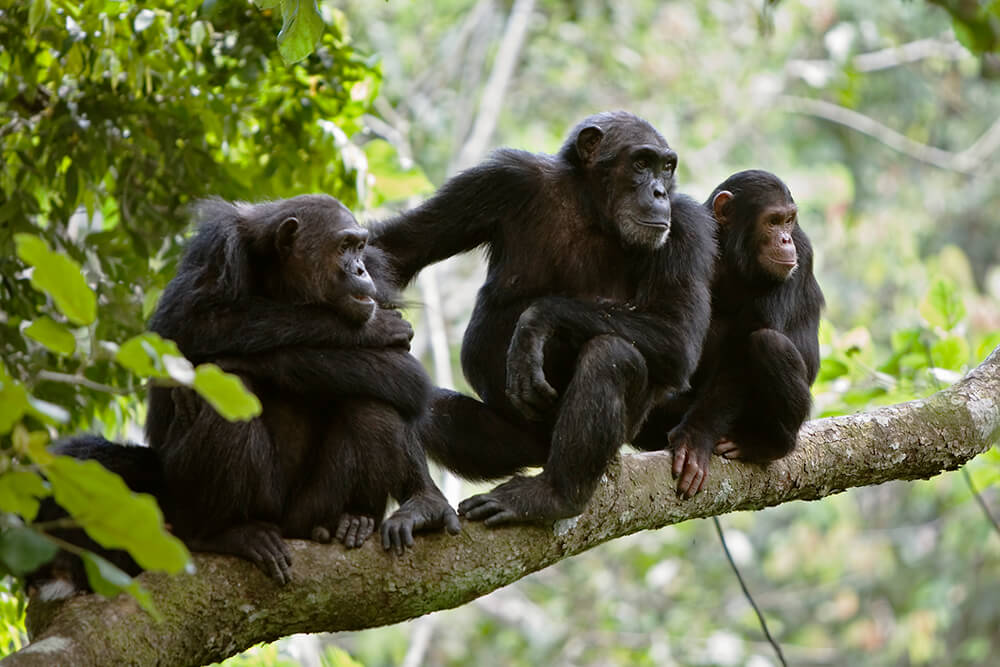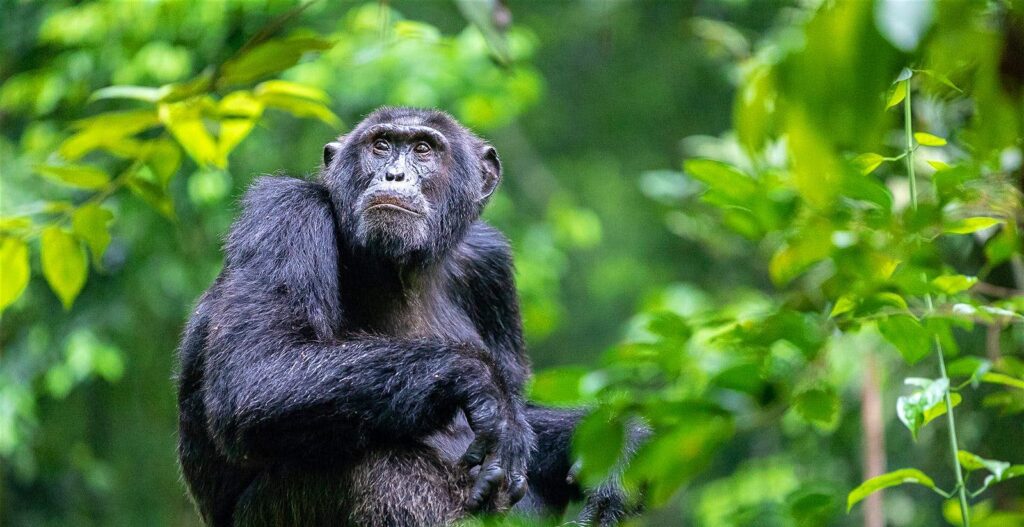Chimpanzees, intelligent and social apes, inhabit the lush rainforests and savannas of Africa. These captivating creatures share a remarkable 98% of our DNA, making them our closest living relatives. With a range spanning over 21 African nations, chimpanzees offer unforgettable encounters for wildlife enthusiasts.
Uganda boasts a thriving chimpanzee population, with Kibale National Park, Kalinju, Kyambura, Semuliki, and Budongo Forest serving as prime destinations for chimpanzee trekking. Rwanda’s Nyungwe National Park also provides opportunities to observe these incredible animals in their natural habitat. Beyond Uganda and Rwanda, Kenya’s Sweetwaters Chimpanzee Sanctuary and Tanzania’s Mahale and Gombe National Parks offer additional chances to witness chimpanzees in the wild.

Recognizable by their dark fur, bare faces, and elongated arms, chimpanzees are adept climbers and walkers. Males typically weigh between 40 and 70 kilograms, while females range from 27 to 50 kilograms. Standing tall at 4 to 5.5 feet, these apes possess a lifespan of around 45 years in the wild and up to 58 years in captivity.
Chimpanzees are renowned for their intelligence, complex social structures, and tool-using abilities. Their playful and curious nature makes them a delight to observe, and their contributions to scientific research have been invaluable. Let’s explore some fascinating facts about these extraordinary creatures.
Chimpanzee Social Life
Chimpanzees are highly sociable creatures, far more so than their ape relatives, gorillas and orangutans. They live in complex communities of up to 80 individuals, though groups of 20 are more common. These communities are fluid, constantly changing based on relationships between dominant males.
Within a community, there’s a clear hierarchy led by a single alpha male. Interestingly, there are often twice as many females as males. Chimpanzees are skilled at navigating social dynamics, forming alliances and cooperating for mutual benefit. Grooming plays a crucial role in building and maintaining these bonds. They exhibit a wide range of human-like emotions, including grief, empathy, and curiosity.

Communication
Chimpanzees are remarkably expressive creatures, communicating through a combination of body language, gestures, and vocalizations. Their repertoire includes hoots, roars, grunts, and screams, each conveying a specific message. To communicate over long distances, they employ louder calls and signals like drumming on trees. For closer interactions, softer vocalizations suffice. Interestingly, chimpanzees also share some human-like expressions, such as smiling, laughing, and grinning.
Chimpanzee Tool Use
Chimpanzees are renowned for their intelligence, which is evident in their innovative use of tools. These clever apes employ a variety of objects to aid in their daily activities, especially when searching for food. Stones, wood, and roots are commonly used to crack nuts, while leaves serve as drinking vessels or cleaning cloths. To extract termites, they utilize twigs or blades of grass. When faced with danger, chimpanzees exhibit defensive behaviors by throwing rocks or branches. Their inquisitive nature is demonstrated by using sticks to investigate potential threats, such as dead snakes.
Chimpanzee Habitat and Diet
Chimpanzees are primarily arboreal, spending much of their time in the treetops where they also build their nests, often using strong ironwood trees for stability. These intelligent apes are predominantly found in tropical rainforests, though they can also inhabit savannah woodlands.
Their diet is omnivorous, consisting mainly of fruits, leaves, shoots, seeds, and flowers. To supplement their plant-based intake, they consume insects, honey, and even small animals like monkeys and antelopes. Chimpanzees are diurnal, beginning their day at dawn when they search for food. Skilled climbers, they effortlessly swing through the canopy and descend to the forest floor when necessary. After a busy morning, they typically take a midday rest before resuming their activities.

